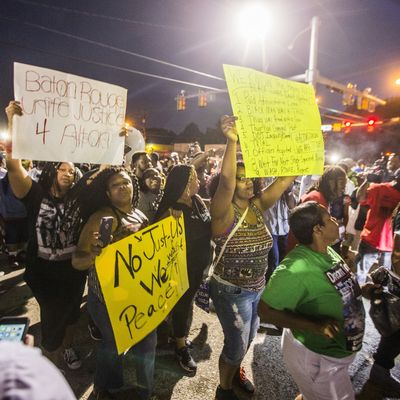
In video of the shooting of Alton Sterling early on Tuesday morning, Baton Rouge police are heard shouting “he’s got a gun” before firing the shots that ended the 37-year-old black man’s life. Officers were responding to a report that a man fitting Sterling’s description had pulled a gun on someone outside the Triple S Food Mart, and Baton Rouge police chief Carl Dabadie Jr. said on Wednesday, “When officers arrived, Sterling was armed and the altercation ensued that resulted in the loss of his life.”
The second video shows more clearly what happened after police officers Blane Salamoni and Howie Lake tackled Sterling and pinned him to the ground. One of the officers has his knee on Sterling’s left arm. Sterling moves his right arm, but his hand isn’t visible. The camera shakes as multiple shots are fired. When it refocuses, Sterling’s chest is bloody, and his arms are splayed out, hands apparently empty. A few seconds later, one of the officers pulls an object from Sterling’s right pants pocket. Police have not confirmed that it was a gun.
The incident was also captured by the store’s surveillance cameras. Muflahti says he refused to turn the footage over without a warrant, but police seized it anyway. “I told them I would like to be in the store when [they took it],” he explained. “They told me they didn’t want me to see the footage.”
Both officers were wearing body cameras, but police say they came loose during the struggle. East Baton Rouge Parish district attorney Hillary Moore III said he was present when the officers were interviewed by the police department on Wednesday, and both “believe they were completely justified in using deadly force.”
James Durdin, Salamoni’s father-in-law, told the New York Daily News that Black Lives Matter protesters, hundreds of whom turned out on Tuesday, are using the situation to promote an anti-police agenda. “It burns my you-know-what when it’s — usually the black people — that try to make an agenda out of this,” Durdin said. “What I’d like to see is them with no police at all, so they can know what it’s like not to have them … The majority of (cops) would never be abusive. Does anyone give a you-know-what about that? We’ll have social chaos (without cops).”
Arthur Reed, a bystander who shot the first video (below), said he did not see the beginning of the incident, but believes Sterling was unarmed when he was shot. “The video speaks for everything that took place,” he told the Daily News. “Even though Mr. Sterling may have had a gun, he didn’t go for it.”
Reed said he waited 16 hours to post the video on social media. “We were waiting to see what the police were going to say,” Reed said. “We felt the video had to be released to show the lies. It is our strong belief that the message we’re sending is not anti-police — it’s anti-injustice.”
Hundreds gathered for a vigil outside the Triple S Food Mart on Wednesday night. There were also calls for Police Chief Dabadie’s resignation, though he insisted, “Like you, there is a lot that we do not understand, and at this point, like you, I am demanding answers.” Louisiana governor John Bel Edwards said on Wednesday that an investigation into the shooting will be led by the Justice Department’s Civil Rights Division. Hillary Clinton released a statement praising the move, saying, “Something is profoundly wrong when so many Americans have reason to believe that our country doesn’t consider them as precious as others because of the color of their skin.”
In a New Orleans Times-Picayune opinion piece, Jarvis DeBerry said the incident should be viewed in context of the Baton Rouge Police Department’s “history of brutality against black people.” He wrote that even fellow law-enforcement agents have made those accusations:
Many law enforcement officials came to Louisiana immediately after Hurricane Katrina to provide reinforcements, and one state trooper from Michigan said Baton Rouge police attempted to thank him for his help by letting him “beat down” a prisoner. A trooper from New Mexico wrote a letter to the Baton Rouge police expressing the concerns of seven New Mexico troopers and five Michigan troopers that Baton Rouge police were engaging in racially motivated enforcement, that they were physically abusing prisoners and the public and that they were stopping, questioning and searching people without any legal justification.
Writing in the Washington Post, Radley Balko speculated that Sterling may have lost his life because the officers miscommunicated about whether he was reaching for the gun or merely had a weapon in his pocket — and the distinction may not matter:
From what we know right now, this appears to be another case of police officers deploying lethal force that was likely legal, but was also unnecessary. The witness’ observation that the police officers appeared to be escalating the situation isn’t contradicted by the video, but the video also doesn’t definitively prove him correct. A police officer can use deadly force if he believes his life or the lives of others are threatened, and if that belief is objectively reasonable. Here we have a witness who says Sterling posed no serious threat, and video that strongly suggests but doesn’t completely the witness’ account to be valid.
In a New York Times op-ed, Roxane Gay said that after hearing of yet another shooting of a black man by police she felt “so very tired” and “had no words because I don’t know what more can be said about this kind of senseless death.” She continued:
I don’t know where we go from here because those of us who recognize the injustice are not the problem. Law enforcement, militarized and indifferent to black lives, is the problem. Law enforcement that sees black people as criminals rather than human beings with full and deserving lives is the problem. A justice system that rarely prosecutes or convicts police officers who kill innocent people in the line of duty is the problem. That this happens so often that resignation or apathy are reasonable responses is the problem.
She said the video she found even more horrific than those of Sterling’s death was that of his 15-year-old son breaking down and crying, “I want my daddy,” as his mother read a statement at a press conference:
“The grief and the magnitude of loss I heard in that boy’s crying reminds me that we cannot indulge in the luxuries of apathy and resignation,” Gay said.






























